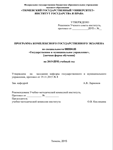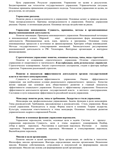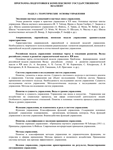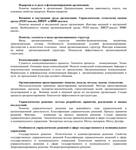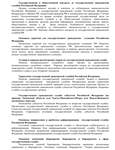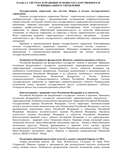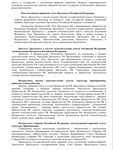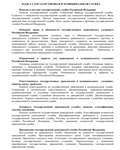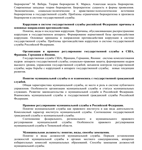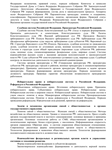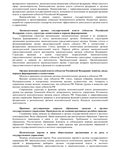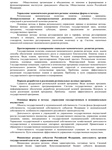TSU Answers to GOSam Bachelor GMU 75 questions spurs
Content: шпоры.rar (229.00 KB)
Uploaded: 01.03.2016
Positive responses: 0
Negative responses: 0
Sold: 2
Refunds: 0
$29
QUESTIONS FOR PREPARATION TO THE STATE EXAMINATION FOR INTEGRATED scientists YEAR 2015-2016
Section 1. Theoretical bases of management
(Control theory, theory of organization, management decisions Development)
1. The evolution of scientific concepts and scientific management of schools.
2. The US, European, Japanese management models: comparative-characterized acteristic.
3. The Russian model of governance: the main features and trends. Contribution Ros-sian scientists in the development of management thought in the XX century.
4. The management and control systems research system.
5. 11onyatie and management entity. Types and levels of management.
6. Control Functions, their relationship and the role of the control system.
7. The concept, classification and evolution of management principles.
8. Control methods.
9. Target management, results-based budgeting, contingency management.
10. Risk management.
11.Upravlenie innovation. The essence, principles, methods and organizational vor we innovation.
12. Strategic management: the concept, the main approaches, types, types of strategies.
13. The concept and performance indicators of the state vla-sti and local government.
14. Manager: the concept of role types and requirements. Leadership and management styles.
15. The concept and basic human resources management functions.
16. The mission and goals of the organization.
17. The hierarchy and its role in the functioning of the organization.
18. External and internal organization Wednesday. Management environment analysis technologies. (PEST-analysis, SWOT and SNW-analysis).
19. The concept, elements and types of organizational structures.
20. Communication in management.
21. Organizational design: concept, models, methods, goals, technologies.
22. Management decision: the development of methods for the adoption, implementation and evaluation in effect.
23. Features of administrative decisions in the sphere of state and municipal-governance.
Section 2. State and municipal service
24. The concept and system of the state service of the Russian Federation
25. Basic rights and obligations of the state civil servant Ros-sian Federation.
26. Restrictions and prohibitions for civil and municipal employees of the Russian Federation.
27. The responsibility of the state civil and municipal employees: in adoption, types of problems.
28. Position the state civil service: concept, classification, spo-Soba replacement.
29. The passage of the state civil service of the Russian Federation.
30. State and public control over the government of the Russian Federation 1razhdanskoy service.
31. The basic guarantees for civil servants of the Russian Fed-eration.
32. Conditions and procedure for dealing with disputes in the civil service.
33. Management of the state civil service of the Russian Federation.
34. The State Civil Service of the Russian Federation (on at least-of the Tyumen region, the Khanty-Mansi and Yugra and Yamalo-Nenets Autonomous Okrug-cars).
35. The main directions and problems of reforming the State Russian Federation.
36. The basic concept of bureaucracy. Bureaucracy and red tape in the sovereign-civil service.
37. Corruption in the public service of the Russian Federation: Causes and main directions of countering.
38. The organization and regulation of the public service in the US, Fran-tion, Germany and Japan.
39. The concept of municipal service and behold the relationship with the state civil service of the Russian Federation.
40. Legal regulation of municipal service in the Russian Federation.
41. Municipal office, concept, types, substitution methods.
Section 3. The system and the legal framework of State and Municipal Power Management-tion
42. Public administration as a system. Forms and methods of governance.
43. Features of Russian federalism. The phenomenon of complex subject.
44. The constitutional - legal status of the Russian Federation and
Section 1. Theoretical bases of management
(Control theory, theory of organization, management decisions Development)
1. The evolution of scientific concepts and scientific management of schools.
2. The US, European, Japanese management models: comparative-characterized acteristic.
3. The Russian model of governance: the main features and trends. Contribution Ros-sian scientists in the development of management thought in the XX century.
4. The management and control systems research system.
5. 11onyatie and management entity. Types and levels of management.
6. Control Functions, their relationship and the role of the control system.
7. The concept, classification and evolution of management principles.
8. Control methods.
9. Target management, results-based budgeting, contingency management.
10. Risk management.
11.Upravlenie innovation. The essence, principles, methods and organizational vor we innovation.
12. Strategic management: the concept, the main approaches, types, types of strategies.
13. The concept and performance indicators of the state vla-sti and local government.
14. Manager: the concept of role types and requirements. Leadership and management styles.
15. The concept and basic human resources management functions.
16. The mission and goals of the organization.
17. The hierarchy and its role in the functioning of the organization.
18. External and internal organization Wednesday. Management environment analysis technologies. (PEST-analysis, SWOT and SNW-analysis).
19. The concept, elements and types of organizational structures.
20. Communication in management.
21. Organizational design: concept, models, methods, goals, technologies.
22. Management decision: the development of methods for the adoption, implementation and evaluation in effect.
23. Features of administrative decisions in the sphere of state and municipal-governance.
Section 2. State and municipal service
24. The concept and system of the state service of the Russian Federation
25. Basic rights and obligations of the state civil servant Ros-sian Federation.
26. Restrictions and prohibitions for civil and municipal employees of the Russian Federation.
27. The responsibility of the state civil and municipal employees: in adoption, types of problems.
28. Position the state civil service: concept, classification, spo-Soba replacement.
29. The passage of the state civil service of the Russian Federation.
30. State and public control over the government of the Russian Federation 1razhdanskoy service.
31. The basic guarantees for civil servants of the Russian Fed-eration.
32. Conditions and procedure for dealing with disputes in the civil service.
33. Management of the state civil service of the Russian Federation.
34. The State Civil Service of the Russian Federation (on at least-of the Tyumen region, the Khanty-Mansi and Yugra and Yamalo-Nenets Autonomous Okrug-cars).
35. The main directions and problems of reforming the State Russian Federation.
36. The basic concept of bureaucracy. Bureaucracy and red tape in the sovereign-civil service.
37. Corruption in the public service of the Russian Federation: Causes and main directions of countering.
38. The organization and regulation of the public service in the US, Fran-tion, Germany and Japan.
39. The concept of municipal service and behold the relationship with the state civil service of the Russian Federation.
40. Legal regulation of municipal service in the Russian Federation.
41. Municipal office, concept, types, substitution methods.
Section 3. The system and the legal framework of State and Municipal Power Management-tion
42. Public administration as a system. Forms and methods of governance.
43. Features of Russian federalism. The phenomenon of complex subject.
44. The constitutional - legal status of the Russian Federation and
6. Constitutional and legal status of the Russian Federation President.
47. The President of the Institute in the system of state authorities of the Russian Federation.
RF President Administration.
48. Federal executive bodies: the structure, formation, interaction problems.
49. The Russian Federal Assembly: the constitutional - legal status, structure formation.
50. The judicial system of the Russian Federation. The Prosecutor´s Office of the Russian Federation.
51. The right to vote and the electoral system in the Russian Federation. Referee doom in the Russian Federation.
52. Tasks and organization of public relations in the sovereign, public administration bodies.
53. The interaction of federal and regional authorities and management: the co-state and development trends.
54. The legislative bodies of state power of subjects of the Russian Federation: the status, structure, competence and procedure of formation.
55. The executive authorities of the RF subjects: concept, types, forms the order-tion and competence
56. The legal regulation of the order of applications of citizens in public administration. Manufacture of administrative complaints by citizens.
57. Political parties and other public organizations and their role in the sovereign-public administration.
58. Management of economic development of the region: the basic forms and methods.
59. Forecasting and planning of socio-economic development of the region.
60. The procedure for the development and implementation of regional programs.
61. The basic forms and methods of management for state and municipal imu-munity.
62. The financial resources of the RF subjects, the activities of public authorities to manage them.
63. The budget system of the Russian Federation.
64. The regional public policies in the social sphere.
65. Local government: concept, principles, functions.
66. The institutions of direct democracy in the local government system.
67. The system of local government. The head of the municipality.
68. The representative bodies of local self-government: the order of formation, competence and responsibility.
69. The executive - administrative bodies of local self-government: the concept, the legal status of signs.
70. The concept, types and system of municipal legal acts.
71. The territorial basis of local self-government. Types of municipal Obra-mations
72. The financial and economic basis of local self-government.
73. State and municipal land management.
74. State and municipal investment policy.
75. State regulation of subsoil use.
47. The President of the Institute in the system of state authorities of the Russian Federation.
RF President Administration.
48. Federal executive bodies: the structure, formation, interaction problems.
49. The Russian Federal Assembly: the constitutional - legal status, structure formation.
50. The judicial system of the Russian Federation. The Prosecutor´s Office of the Russian Federation.
51. The right to vote and the electoral system in the Russian Federation. Referee doom in the Russian Federation.
52. Tasks and organization of public relations in the sovereign, public administration bodies.
53. The interaction of federal and regional authorities and management: the co-state and development trends.
54. The legislative bodies of state power of subjects of the Russian Federation: the status, structure, competence and procedure of formation.
55. The executive authorities of the RF subjects: concept, types, forms the order-tion and competence
56. The legal regulation of the order of applications of citizens in public administration. Manufacture of administrative complaints by citizens.
57. Political parties and other public organizations and their role in the sovereign-public administration.
58. Management of economic development of the region: the basic forms and methods.
59. Forecasting and planning of socio-economic development of the region.
60. The procedure for the development and implementation of regional programs.
61. The basic forms and methods of management for state and municipal imu-munity.
62. The financial resources of the RF subjects, the activities of public authorities to manage them.
63. The budget system of the Russian Federation.
64. The regional public policies in the social sphere.
65. Local government: concept, principles, functions.
66. The institutions of direct democracy in the local government system.
67. The system of local government. The head of the municipality.
68. The representative bodies of local self-government: the order of formation, competence and responsibility.
69. The executive - administrative bodies of local self-government: the concept, the legal status of signs.
70. The concept, types and system of municipal legal acts.
71. The territorial basis of local self-government. Types of municipal Obra-mations
72. The financial and economic basis of local self-government.
73. State and municipal land management.
74. State and municipal investment policy.
75. State regulation of subsoil use.
No feedback yet
